|
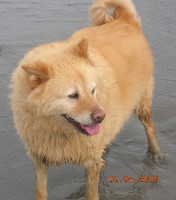 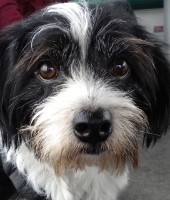 Poisonous Plants & Dogs Poisonous Plants & Dogs
Dogs get allergies just like we do, but more often than not, a pollen allergy will make a dog scratch and itch, rather than have a runny nose. That said, sometimes dogs will respond to allergenic pollen much the same as we do…their nose will run, their eyes will get red, and sometimes they’ll sneeze.
Because dogs are built closer to the ground, and because a typical dog will run in and out of the bushes, through the groundcovers, and will roll on the lawn and in the leaves, a dog will often get much more exposure to allergenic plants than might his owner.
Allergy Plants all dog owners should avoid using:
1. Bottlebrush trees or bushes: the pollen is tiny and needle-point sharp, and if a dog comes in contact with these red flowers the pollen on them will stick to his/her coat. This pollen can make a dog itch, scratch, cough or sneeze.
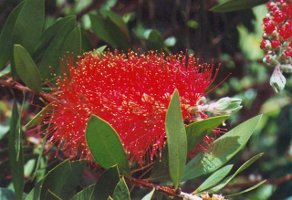 |
| Bottlebrush |
2. Male juniper bushes: these make a lot of very allergenic pollen and it will make dogs itch and scratch. Only use juniper plants that have berries….these are female, and will not make any pollen. (Any juniper bush without berries is suspect.)
|
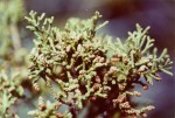
|
| Male Juniper |
3. Fruitless mulberry trees: these produce loads of very tiny, highly allergenic pollen each spring, and it will trigger all manner of allergies in dogs.
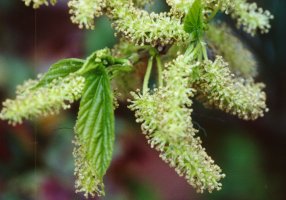 |
| Male pollen flowers on fruitless mulberry tree |
4. All Euphorbia species, such as spurge, milk bush, chenille plant, pencil tree, etc. The sap from these is poisonous to dogs, and the pollen from them is allergenic. Contact with these plants may trigger itch and scratching or red and runny eyes in dogs.
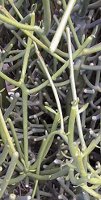 |
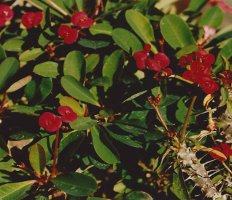 |
| Pencil tree |
Crown of Thorns |
5. Male yews and male Podocarpus shrub, trees: Pollen from these can trigger numerous allergies in dogs; the plants themselves are poisonous to a dog if eaten.
|
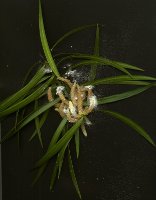
|
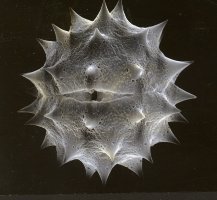
|
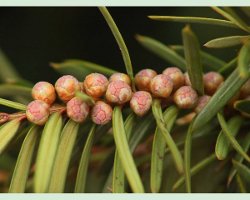 |
|
Podocarpus Henkelii
|
Pollen Grain |
Male Yew Pollen Flowers |
6. Gas plant, perennials: gas plant can trigger several kinds of dog allergies.
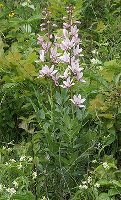 |
| Gas plant |
7. Primrose tree: will cause itch and scratching in dogs.
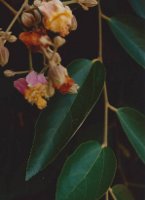 |
| Primrose tree |
8. Purple leaf, velvet plant: can irritate dogs’ eyes and skin from contact.
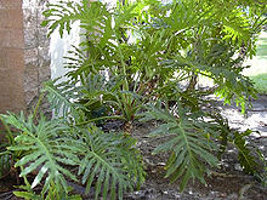 |
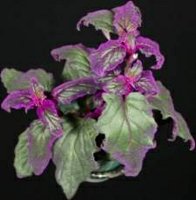 |
| Philodendron |
Purple Leaf Velvet Plant |
9. Common Bermudagrass produces considerable pollen, even if kept mowed low. This pollen will make dogs itch and scratch. A better choice would be hybrid Bermudagrass, as these make little or no pollen. Another good choice is one of the female clones of Buffalograss, such as ‘609’, ‘Legacy’ or ‘UC Verde’ as these are pollen-free lawn grasses.
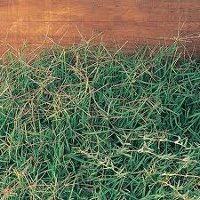 |
| Bermuda Grass with flowers |
10. Primrose malacoides can easily cause itching and scratching for most dogs…as well as their owners.
11. The houseplant or groundcover, Wandering Jew is notorious for causing itchy, red and runny eyes in dogs, and should not grow where dogs play.
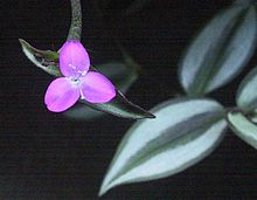 |
| Wandering Jew |
12. Oak pollen can cause allergies in dogs.
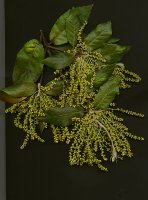 |
| Male pollen flowers on Oak |
13. Pollen from acacia shrubs and groundcovers can trigger itching, scratching in dogs.
14. Snailseed vine: pollen from male vines will cause allergy in dogs; eating Snailseed vine can kill a dog.
15. Castor bean plants: the pollen is highly allergenic to any dog, and the seeds, if eaten, will usually result in death.
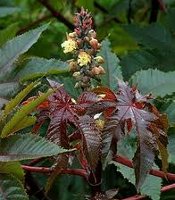 |
| Castor bean |
16. Daylily plants can cause contact itch and scratching in dogs…eating daylily will kill a cat. No kind of lily is very safe for dogs, and included with this would also be daffodils, narcissus, tulips, and agapanthus. Onions are related to lilies, and no dog (or cat) should ever eat onions.
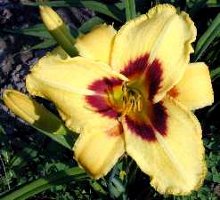 |
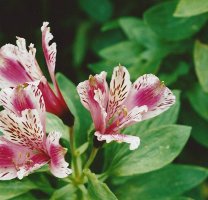 |
| Daylily |
Peruvian Lily |
17. Male trees of any species (such as maple, ash, poplar, aspen, mulberry, willow, box elder, pepper tree, Chinese Pistache) will shed considerable pollen, and after several years of exposure to this pollen, many dogs in the same yard as these trees will develop allergies…usually causing itching, biting and scratching.
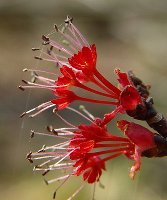 |
| Male Red Maple Pollen Flowers |
 Other things to consider with dogs and allergies: Other things to consider with dogs and allergies:
1. Do not use coca mulch as some dogs will eat it, and it can poison them.
2. Do not leave hardwood sawdust around dogs; do not use it for bedding as it can trigger numerous allergies. Red cedar shavings can also cause allergies for dogs.
3. Any shrub in the yard that looks dirty and usually has many insects on it….it will trigger several kinds of allergies for dogs, including insect dander allergy and mold allergy.
4. People often blame the dog for their allergies, when what is much more common is that in their yards they have highly allergenic plants, and the dog comes in contact with these pollens, they get on its fur, and then the dog brings these allergens inside. Rather than getting rid of the family dog, it makes much better sense to get rid of the allergenic plants in the yard, and to then replace them with allergy free plants.
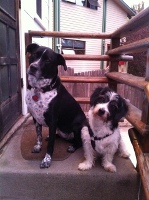 5. Dog food: a dog is related to the fox, the coyote, the wolf, and all of them are primarily meat, bone eaters. If all else fails with your dog, try putting him/her on a grain-free diet. No kibble. This usually means a diet of mostly meat and bones. Leafy green vegetables such as kale, mustard greens or collard greens are good for dogs. They can be chopped up, boiled, and then mixed in with some hamburger. No dog will be allergic to this kind of food. 5. Dog food: a dog is related to the fox, the coyote, the wolf, and all of them are primarily meat, bone eaters. If all else fails with your dog, try putting him/her on a grain-free diet. No kibble. This usually means a diet of mostly meat and bones. Leafy green vegetables such as kale, mustard greens or collard greens are good for dogs. They can be chopped up, boiled, and then mixed in with some hamburger. No dog will be allergic to this kind of food.
6. Seeds from fruit trees: some dogs will eat fruit in the yard, seeds and all. Loquats have very large, not very hard seeds and they are poisonous to dogs.
7. Dogs that eat plants: some dogs chew on or eat all kinds of garden plants. If your dog does this, try to stop it, and quickly consider getting a copy of the book, Safe Sex in the Garden, as it has a very large, comprehensive listing of almost all common (and uncommon) garden plants that are poisonous to dogs (and children, too). Out of print now, used copies are often available at very low prices on-line from Amazon.com or other book sites.
8. House plants: many of these (such as dumb cane, elephant ears, philodendrons, some ferns, cyclamens, and others) could be poisonous if eaten by a dog.
 |
|
Tom and his friend in the Southern Alps, New Zealand
Photo by Dieter Steinegg
|
|



 Poisonous Plants & Dogs
Poisonous Plants & Dogs


















 Other things to consider with dogs and allergies:
Other things to consider with dogs and allergies:
